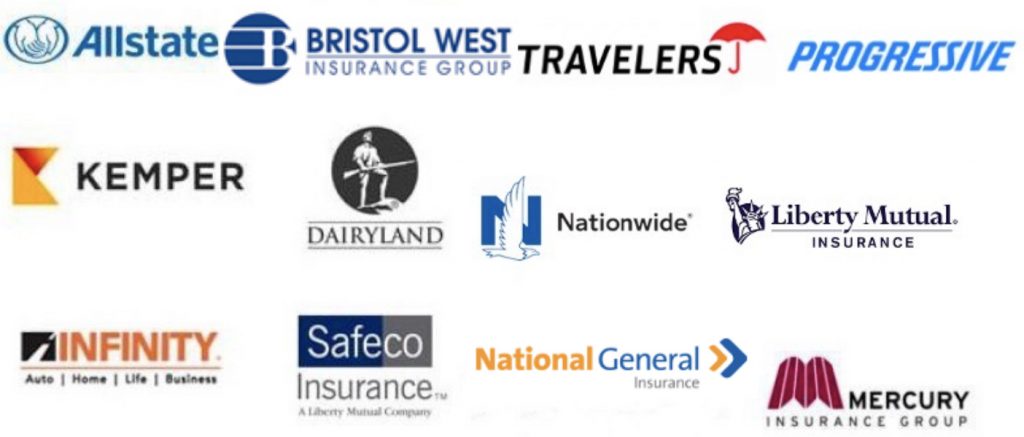Types of Coverage
You might be curious about what kind of car insurance policy to buy — and the car insurance rates you’ll end up paying — when seeking a new policy or considering switching car insurance providers. Comprehensive and collision coverages are not mandatory in any state, but most states offer room to build a policy that suits your financial situation and driving needs.
Comprehensive
Comprehensive insurance is an optional addition available with most car insurance policies. It covers damage caused by or related to theft, animals, vandalism, and weather. You should think of it as coverage that doesn’t cover your vehicle colliding with something — that would be handled via collision coverage. On average, a comprehensive claim will raise your premium by $36 every six months.
Comprehensive coverage insures against damage that does not occur as a result of colliding with another car. Below are some common examples of when comprehensive coverage could be used to cover a claim:
- Flood damage and weather-related occurances like hailstorms
- Damage caused by animals (insects, rodents, etc.)
- Collision with a deer or other animal (the one exception to rule stated above)
- Stolen car or vandalism
Collision and comprehensive coverage work together to protect against physical damage to your vehicle. In an accident, your collision insurance covers your vehicle when it collides with another object. Examples of this include:
- A collision with another vehicle or vehicles
- A crash into a fixed object, such as a pole or a wall
Collision
Collision insurance covers damage to your vehicle in the event of an accident, such as a fender bender or a collision with a fixed object. Unlike liability insurance, collision coverage is not required by law. It is usually mandated if you’re financing or leasing a vehicle. Collision insurance is subject to a deductible: the amount you’re responsible for paying prior to your auto insurance coverage kicking in.
Collision coverage protects your car if it collides with another vehicle or fixed object. This coverage applies regardless of fault. However, filing a collision claim involves paying a deductible and typically raises your future premiums. Collision insurance covers:
- Property damage to your vehicle sustained in a collision
- Property damage sustained by hitting a fixed object, such as a tree or wall
- Damage to your vehicle caused by an uninsured or hit-and-run driver
- Damage sustained after losing control of your vehicle because of an icy road
- Damage caused by hitting a pothole
State laws do not require collision coverage. If you’re leasing or financing your car, the dealer might require it. If you own a high-value vehicle, this coverage is highly recommended.
Uninsured and Underinsured Motorist
Some drivers only carry the minimum liability coverage, which might not protect you or in your vehicle in full, if you were to be the victim of an at-fault collision. To prepare for this scenario, underinsured coverage will pay your damages in the event the driver does have insurance, but the damages would exceed the liability limits of their policy. Uninsured motorist kicks in for events such as a “hit-and-run” — when you’re in a non-at-fault accident and the other driver is uninsured.
Underinsured and uninsured can be further broken down into two more specific coverages:
- Uninsured property damage insurance coverage: protects your vehicle from physical damage in a car accident, while clarifying to your insurance company that the accident was not your fault and therefore will prevent your insurance rates and deductible from rising.
- Uninsured bodily injury insurance coverage: covers your medical bills and other fees if you sustain any bodily injury in the event of a car wreck. This, unlike uninsured property damage insurance, does not have a deductible.
Auto Liability
Liability insurance coverage protects other drivers from bodily injury or property damage you might cause in an at-fault accident. It is the most basic form of auto insurance and does not cover you or your vehicle in an accident. It is required by nearly every state in order to legally drive and register your vehicle.
Liability coverage comprises two key coverages: bodily injury and property damage liability.
- Bodily injury covers the medical bills for which you are responsible in a collision. Bodily injury insurance is allocated on per-person and per-accident bases.
- Property damage covers the property damage you cause — to a vehicle, structure, bicycle or other property.
Medical Payments
Medical payments coverage — often called Med Pay — provides medical and/or funeral expenses after an auto accident. Med Pay is typically expressed as a coverage limit on your insurance policy and does not feature a deductible. Medical payments coverage for car insurance is currently required in only in New Hampshire, Pennsylvania, and Maine, but can be added as optional coverage in other states.
Personal Injury
Personal Injury Protection (PIP) coverage is the portion of a car insurance policy that provides medical expenses and work loss coverage for you and your passengers after a car accident, regardless of fault. PIP coverage is often a requirement in “No-Fault” states, as it covers your injuries, no matter who caused the accident.
You should consider PIP if:
- State law requires it
- You commonly drive with passengers in your vehicle who could hold you responsible for their medical expenses if they were injured in an accident.
- You don’t have a great health insurance plan. Comprehensive health insurance coverage renders PIP or medical car insurance less necessary. If in doubt, check with your healthcare provider.
Personal injury protection insurance is a “no-fault” coverage. Meaning even if you are determined to be at fault in an auto accident, medical expenses (such as medical and surgical treatment, ambulance fees, and medication) for you and your passengers will be covered up to the policy’s limit. It replaces the standard bodily injury liability portion of your insurance policy. PIP can also be used to recover lost wages and rehabilitation services.
PIP insurance covers:
- Medical bills
- Surgical fees
- Ambulance fees
- Wost wages
- Rehabilitation services
Ask For A Review Of Your Policy and Discounts. Let Us Compare Quotes From Top Carriers For You!

Get a FREE Quote Now!
(888) 365-6602

Get Connected to a Real Agent!
No Hold Time, Ever.







